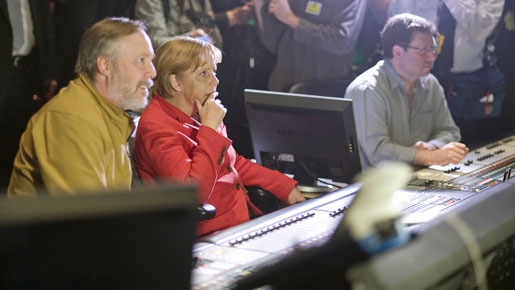
Berlin’s film business is booming, with low production costs, generous subsidies and cultural cachet attracting some of the world’s top filmmakers scouring for funds in the wake of the crisis.
Internationally acclaimed directors from Quentin Tarantino to Roman Polanski are flocking to film in the German capital, churning out hits like “Inglourious Basterds” and “The Ghost Writer”, while home-grown talent such as Til Schweiger and Roland Emmerich have returned from Hollywood to join the party.
And what Berlin’s film industry lacks in size, ranking well behind Hollywood, it makes up for in prestige, landing dozens of prizes in the past few years including a handful of Oscars.
“Berlin has some key success factors: one is the city itself – people simply want to be in Berlin,” said Carl Woebcken, the chief executive of Babelsberg, the world’s oldest large-scale studio complex just a short train ride from the city centre.
Since German reunification two decades ago, Berlin has metamorphosed from a divided and beleaguered city into a sassy cultural mecca for creative types looking for cheap rents and an escape from the establishment.
“It’s a very affordable city so it’s relatively cheap to make films here,” Woebcken told reporters in a spacious office overlooking the 100-acre studio site.
“We also have a very high variety of locations around Berlin which other places don’t have – all these military bases and so many different types of architectures from old to new, from communist East German to Nazi,” said Woebcken.
Recent films made in Berlin and taking advantage of historic locations include the Oscar-winning “The Lives of Others” about an East German secret police agent and World War Two drama “Valkyrie” starring Tom Cruise.
Subsidies magnet
Generous state subsidies for films in Berlin and Europe at large, from soft loans to tax credits, have proven all the more crucial in the face of the global credit crisis.
These have helped small European studios avoid the fate of their US independent counterparts, which were more dependent on hedge funds and banks and saw financing dry up.
“Given that the films in Europe depend less on private investors, they were also less impacted by the crisis,” said Kirsten Niehuus at Medienboard Berlin-Brandenburg, a local funding board which doled out nearly €30m ($40m) in 2009.
“You could clearly notice filmmakers trying to get financing from elsewhere in reaction to the financial crisis. And this offers Germany a chance to work with exciting, international talent,” said Niehuus, adding that this know-how transfer had brought the competence of German crews up to top standards.
The creation in 2007 of the German Federal Film Fund (DFFF), offering filmmakers grants worth up to 20 percent of a film’s budget, gave the Berlin film industry an extra boost.
Some of the money must be spent in Germany, said Niehuus, but the DFFF imposes fewer restrictions than funds in other countries such as Britain or France, thereby attracting more international co-productions.
“It is all about financing, closing the finance and producing cheaply,” said Woebcken. “Going to the sets and having dinner with the director: that’s the fun part of the business, but the reality of course only has to do with numbers.”
The euro’s weakening against the dollar during the crisis has made Berlin all the more attractive to U.S. filmmakers.
And while some fear European film funds could suffer from impending austerity drives, Germany’s has so far been ring-fenced from deep state spending cuts, said Niehuus.
Cutbacks elsewhere could drive more filmmakers to Berlin. Britain recently announced plans to axe the UK Film Council, which lobbies for the British film industry and invests £15m ($23m) a year in local features.
Digital revolution
Founded in 1912, Babelsberg is just one of more than 50 studios in and around Berlin but epitomises the rich cinematic heritage and fickle fortunes of the city’s film industry.
Once one of the world’s top studios setting the cultural agenda, it has produced both some of the most admired and detested films, from Metropolis to anti-Semitic propaganda.
Woebcken and his business partner Christoph Fisser acquired the studio from French media group Vivendi Universal in 2004 for a symbolic one euro and pulled it out of the red, getting rid of over half the employees and making production leaner.
Rather than seeking to revive its prewar heyday, they decided to rent out its sets and services to filmmakers from Germany and abroad. Berlin’s film industry has thus in a sense become the production centre for many major US studios.
“The definition of a studio in America is that you own the rights and have the money to exploit the rights – distribution and everything,” said Woebcken, sitting in front of an imposing Rothko imitation painted in Babelsberg’s arts department.
“That requires a capital base we don’t have, so we are basically a supplier – like everyone else in Europe.”
Thanks to its long history, Babelsberg can cater to nearly all stages of production, with sprawling props and costume warehouses on site as well as the arts department ranging from carpentry through to locksmiths’ workshops.
But Woebcken said Berlin now needs to focus on developing visual effects skills, which were reducing production costs and revolutionizing the film industry.
“You can create scenes digitally with much less expense than if you had to build them physically,” he said. “The whole team of the new Emmerich film “Anonymous” is sitting in that building opposite now and completing the film – digitally.”

